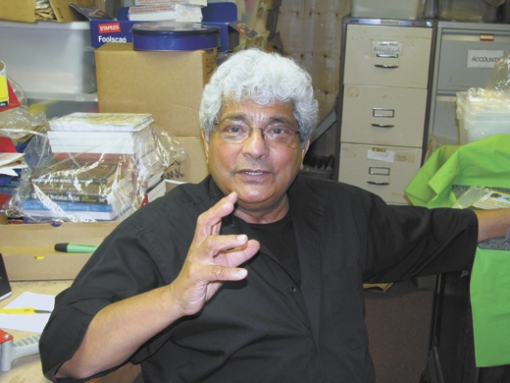Books: Review - Caribbean Publishing in Britain: A Tribute to Arif Ali. By Asher and Martin Hoyles

Published: 22 September, 2011
by ANGELA COBBINAH
WHEN Arif Ali arrived in Britain for the first time in September 1957, he had only a penny in his pocket, having travelled from Guyana via the Canary Islands, Spain, Italy and France.
It was a typically adventurous passage for someone who would go on to head the largest black publishing company in Europe.
Called Hansib, that company celebrated its 40th anniversary last year, having brought out more than 200 titles in addition to a number of newspapers and magazines that were popular black publications of the 1970s and 1980s.
A new book from the Hansib stable tells Ali’s story as part of a loose history of black publishing in Britain.
It is a story that dates back to the 18th century, with interesting chapters on anti-slavery campaigner Richard Wedderburn’s 1817 periodical The Forlorn Hope, the League of Coloured Peoples 1930s’ journal The Keys, and the little-known Caribbean News, published by the London branch of the Caribbean Labour Congress between 1952 and 1956.
Emerging from the same period, the West Indian Gazette is credited with being Britain’s first black newspaper.
The writer Donald Hinds, who reported for it in between shifts as a bus conductor, described it is a “child from an insalubrious part of town… whose life was destined to be short and somewhat bruising”. And so it proved.
After being at the heart of the anti-racist struggle that intensified after the Notting Hill race riots of 1958, it faded away following the death of its editor, Claudia Jones, in 1964.
The monthly magazines Tropic and Flamingo of the early 1960s reflected a more confident and settled migrant community with soft features on sport and hair care intermixed with articles about celebrities like Cy Grant and political figures like Martin Luther King and Oswald Mosley.
After a brief look at pioneering publishing houses New Beacon Books and Bogle-L’Ouverture, Ali becomes the main focus of the book.
But don’t be put off because the story of Ali the publisher is genuinely engaging, beginning as it does with Ali the grocer and his shop in Tottenham Lane, Crouch End, circa 1966.
As one of the few stores selling West Indian produce, customers would come from all over London to stock up and Ali saw a fresh business opportunity in the demand for Caribbean newspapers.
Using a Gestetner manual printing machine, he reproduced articles from them and called it the The West Indian. “We sold it for tuppence and frankly couldn’t print enough copies,” he says. “It was a primitive effort but people wanted news from the Caribbean and we gave it them as best we could.”
Bitten by the publishing bug, Ali sold the shop and launched Hansib in 1970 with West Indian Digest, a monthly magazine.
He then bought the ailing West Indian World in 1973 before setting up weekly newspapers Caribbean Times, Asian Times, and African Times, as well as Roots, a glossy-style magazine aimed at the “buppie” market, in the 1980s.
Since 1997, Hansib has devoted itself to publishing books and it is safe to say that titles like the Ethnic Business Directory, The State of Black Britain and Third World Impact would probably not have seen the light of day in today’s market-driven publishing industry.
The company’s ethos, Ali says, is to “record as well as advance the minority contribution to life in Britain”.
Written by husband and wife team Asher and Martin Hoyle, Caribbean Publishing is an interesting but disjointed mix of biography and history. As far as the latter goes, there are glaring omissions.
For example, no mention is made of The Voice newspaper, which in its heyday signalled the dramatic shift from migrant to Black Briton and was a much more polished product than Ali’s Caribbean Times.
Perhaps it would have been better to have come clean and called this book a biography with the historical material forming part of an addendum or even saved for another day.
Ali is clearly such a larger than life figure that he could easily fill a whole book without it even being a “tribute”.
• Caribbean Publishing in Britain: A Tribute to Arif Ali. By Asher and Martin Hoyles. Hansib £9.99



